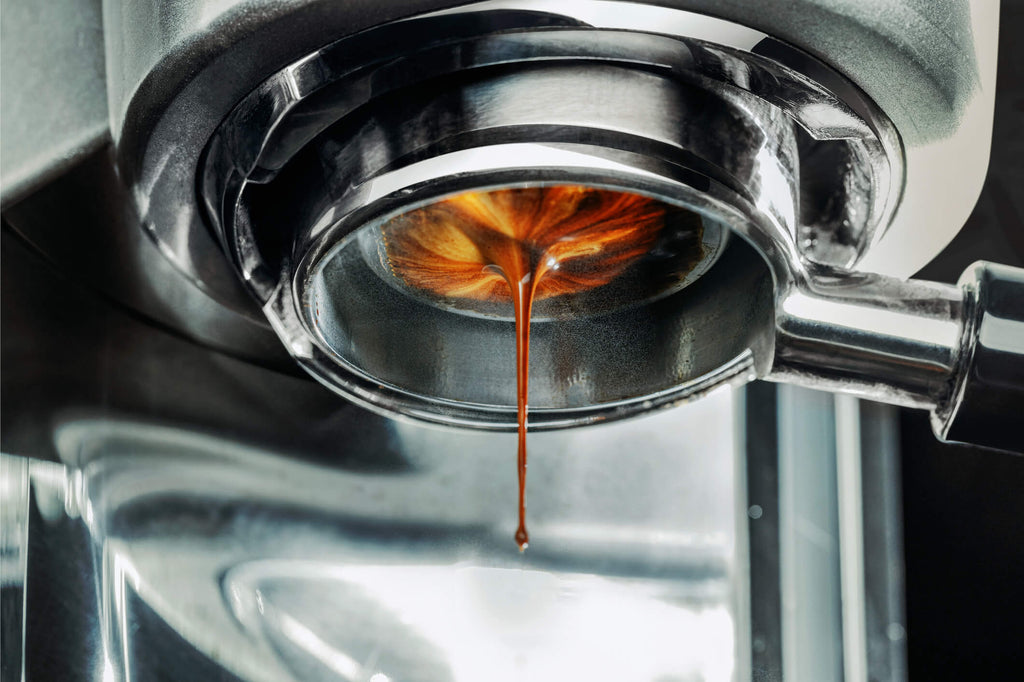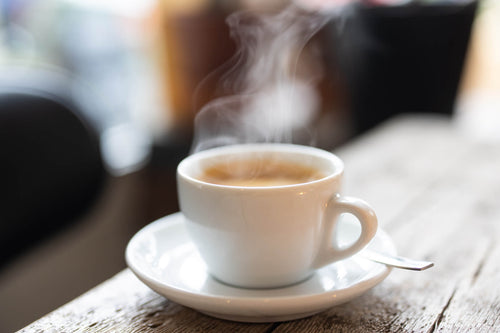Around 400 million cups of coffee are consumed in the United States each day. If you are one of the 150 million coffee drinkers in the US, you have likely sipped a cup of coffee or espresso and noticed the flavor is not up to par. While the coffee bean is usually the star of the show, the water used to extract flavor from these beans is an often underappreciated aspect of coffee making. In this article, you can learn five tips to follow when choosing the best water filtration system for your coffee shop or home coffee maker.
Why filter water for coffee and espresso?
Water makes up about 98% of coffee and espresso drinks, so creating these beverages with the best water possible is essential. When unwanted minerals, chemicals, or other elements contaminate water, they overpower the flavor of your beverage. Ultimately, water should not be noticed in a cup of coffee or espresso. Rather, it should provide a clean base that allows the flavors and aromas of the drinks to shine. In a competitive market, a quality water treatment system can mean the difference between retaining customers and losing them.
Water filtration tips for better tasting coffee and espresso
1. Know the content of your water
Knowing the makeup of your water is the first step to choosing any water filtration system. If you understand what chemicals, elements, or minerals are in your water, you can choose the water treatment system to remove them most effectively and efficiently. For example, if your home uses water from a well, you may have an abundance of iron in your water. On the other hand, municipal water supplies always contain chlorine or chloramines that should be removed before the water is used in coffee or espresso.
If you own a home with a well, you must get your well water tested annually. Some counties offer free well testing, so check testing opportunities in your county first. The EPA has also published a list of certified laboratories in each state that will test your water samples.
If you are hooked up to a municipal water supply, you can use at-home test kits to test for specific contaminants in your water, or you can send a water sample into a certified laboratory.
Learn more: Lab water tests vs at-home test kits
2. Always remove chlorine from your water
If you are using city-treated water in your home or coffee shop, then your water contains chlorine and chloramines. These chemicals must be removed if you wish to produce a quality cup of coffee. Chlorine and chloramines can be reduced by a simple activated carbon filter, such as in a refrigerator filter, under-sink carbon filter, or water pitcher filter. Reverse osmosis systems, a more advanced water treatment method, remove chlorine, chloramines, and an abundance of contaminants from water. Certain RO systems also add beneficial minerals back into the treated water.
Activated carbon filters remove:
- Chlorine
- Chloramines
- Foul tastes and odors
- Trihalomethanes
- Herbicides and pesticides
- Mercury
- Lead (if certified)
- Iron (if certified)
Reverse osmosis removes:
- Chlorine
- Chloramines
- Fluoride
- Salt
- Sediment
- Arsenic
- VOCs
- PFAS
- Microplastics
- Herbicides and pesticides
- Heavy metals
- Many other contaminants
Learn more: How to remove chlorine from drinking water

3. Manage mineral content
The mineral content in water enhances its flavor, especially when used in beverages like coffee and espresso. The ideal treatment system for coffee allows you to control the mineral content left in the final product. Commercial water filters for coffee, tea, and espresso are specialized to provide the perfect water quality for their applications.
If you want to enhance the quality of your coffee at home, you can keep minerals in your water in one of two ways: by using a filter that does not remove these minerals or by treating your water with a remineralization filter. If your home’s water supply contains a good balance of minerals for your beverages, you may only need an activated carbon filter for the perfect cup of coffee or espresso. If you have unwanted or excessive minerals in your water, you may wish to use a reverse osmosis system with a remineralization postfilter. These systems cleanse your water from most impurities and provide an ideal balance for extraction.
What is the best mineral content for coffee?
According to the Specialty Coffee Association (SCA), the ideal water for coffee contains the following mineral content:
- TDS (Total Dissolved Solids): 75-250 ppm
- Calcium hardness: 1- 5 grains or 17- 250 ppm
- Total alkalinity: at or near 40 ppm
- pH: 6.5- 7.5
- Sodium: at or near 10 ppm
4. Prevent limescale buildup in machines
If you live in an area with hard water, you are likely familiar with the unpleasant site of gray or white limescale deposits in appliances and pipes. While you should clean off limescale from your filtration devices with distilled vinegar, you also want to address the source of limescale, calcium and magnesium in water. Calcium and magnesium are water-hardening minerals present in many water sources in the United States. Not only does calcium produce unsightly deposits on water treatment systems, but it also bitters the flavor of coffee. Magnesium, on the other hand, brings out the flavor of a coffee bean. Ideally, both magnesium and calcium should be removed from water, then magnesium can be reintroduced by a remineralization postfilter once the water is treated. Remineralization is important because it allows you to add minerals that enhance your coffee’s flavor and omit the ones that do not.
The best method for removing water-hardening minerals from water is a water softener. You can remove hardness with a reverse osmosis system, but the RO membrane will suffer as a result. A water softener can treat all water that enters your home or business, protecting plumbing, appliances, and water treatment systems. During the softening process, salt is added to water, so you must ensure the water treatment system you use can remove this salt before it bitters your coffee or espresso. Salt-free water softeners, also called water conditioners, are popular for treating limescale in homes with hard water. However, they only prevent limescale and do not actually remove these minerals from water. Consequently, they should not be used on water in coffee or espresso because the flavors of these minerals will remain.
Learn more: Water conditioners vs water softeners
5. Choose the best system for your specific needs
There is no one-size-fits-all water treatment system for the best cup of coffee. In many cases, the water treatment system that works best for you would be too weak or overkill for someone else. Whether you are looking to enhance your coffee shop’s beverages or your coffee at home, there is a water treatment system that best suits your needs.
What is the best filtration system for a coffee shop?
The best water filtration for a coffee shop depends on the chemistry of the incoming water. Water used for coffee and espresso must have some mineral content to enhance flavor. For example, TDS levels should range between 75 and 250 ppm. A little bit of hardness, around two to five grains per gallon, can be beneficial as well. The right amount of mineral content allows the extraction and oils to come out of the beans, whereas too many minerals bond with the oils and inhibit extraction. Without enough mineral content, the coffee or espresso tastes flat due to low extraction.
To get the best water for a coffee shop, you must pay attention to the contamination levels of the incoming water. Maybe the mineral content in the water is just right, so you would only need to filter out the chlorine and chloramines. If there are too many minerals, then you will need to invest in a treatment system to reduce them. Many products can blend some of the raw water while removing water-hardening minerals, allowing you to hit the sweet spot of water quality to enhance the flavor of your coffee and espresso.
Learn more: A guide to commercial water filtration for coffee
What is the best water filter for a home coffee machine?
The best filtration for your coffee at home removes the contaminants specific to your local water quality. In some regions, removing only the chlorine and chloramines from the water provides a great cup of coffee. Some wells or municipal water supplies may contain many water-hardening minerals. In this case, you will want to invest in a water softener, not just for your coffee, but for the health of your plumbing and appliances as well. Water softeners add sodium to water, adding a bitter taste to your coffee. A reverse osmosis system removes this sodium and practically all other contaminants from water. Some RO systems even contain a remineralization filter, adding beneficial minerals back to the water to give it just the right amount of bite.
Learn more: What is a water softener? | What is a reverse osmosis system?
Popular coffee and espresso water treatment systems
Everpure QC7i Single-ESO7
Best used for: Small specialty coffee, espresso, and iced tea applications
The Everpure QC7i Single-ESO7 uses a unique three-stage blending process to provide softened, buffered, and filtered water for coffee, espresso, and tea. It allows a small amount of carbon filtered water to bypass the initial softening resin to provide proper initial hardness. Its high-capacity coconut carbon filter reduces chlorine, bad tastes, and foul odors, allowing the flavor of your coffee, espresso, or tea to shine.
Benefits
- Three-stage blending cartridge
- Ion exchange resin
- High-capacity coconut carbon filtration
- Buffering prevents too much acidity
- Reduces chlorine, bad tastes, and foul odors
- Simple cartridge replacement
3M DP290
Best for: Large cold beverage, ice, and coffee applications
The 3M DP290 is a dual-port water filtration system that provides clean water for coffee, ice, and cold beverages at a flow rate of up to 10 gallons per minute (gpm). It reduces up to 99.99% of bacteria with its HF90 cartridge, preventing fouling to the filter media. This system is also compatible with expansion kits to enable higher capacities and flow rates as needed. In addition to its excellent filtration, the 3M DP290 features a pressure gauge and inlet shut-off valve for simple installation and operation.
Benefits
- Reduces sediment and particles to extend life of pumps, valves, O-rings, and seals
- Built-in bacteria inhibitor to prevent media fouling
- High capacity and flow rate
- Removes chlorine, bad tastes, and foul odors
- Simple cartridge replacement
Everpure EV9239-74
Best for: High-volume commercial applications
The Everpure EV9239-74 High Flow Quad 7FC Filter System provides high-quality water for multiple forms of commercial equipment, such as coffee brewers, espresso machines, and hot chocolate dispensers. The 7FC cartridges balance chemical and mechanical reduction to optimize performance in all water qualities. This system features a scale-inhibitor cartridge to protect equipment from damaging scale buildup, elongating the life of machines. The Everpure EV9289-74 accomodates up to 10 gallons per minute (gpm) combined flow rate, powering through even demanding workloads.
Benefits
- Extended life 7FC cartridges
- Scale inhibitor cartridge
- Prevents membrane fouling from bacterial growth
- Removes chlorine, bad tastes, and foul odors
- Simple cartridge replacement
Everpure QL2-OCS2
Best used for: Office coffee applications
The Everpure QL2-OCS2 provides fresh, premium water for low flow, low volume brewers. Its Micro-Pure II filter media prevents the growth of bacteria, and the activated carbon reduces chlorine, unpleasant tastes, and foul odors. This filter is designed to always feed the correct amount of scale inhibitor into each volume of water, preventing damage to the filter membrane caused by limescale.
Benefits
- Prevents bacterial growth
- Saves energy by reducing scale buildup
- Reduces dirt and particles above 0.5 micron
- Removes chlorine, bad tastes, and foul odors
- Simple cartridge replacement
If you have any additional questions, please do not hesitate to contact us.
